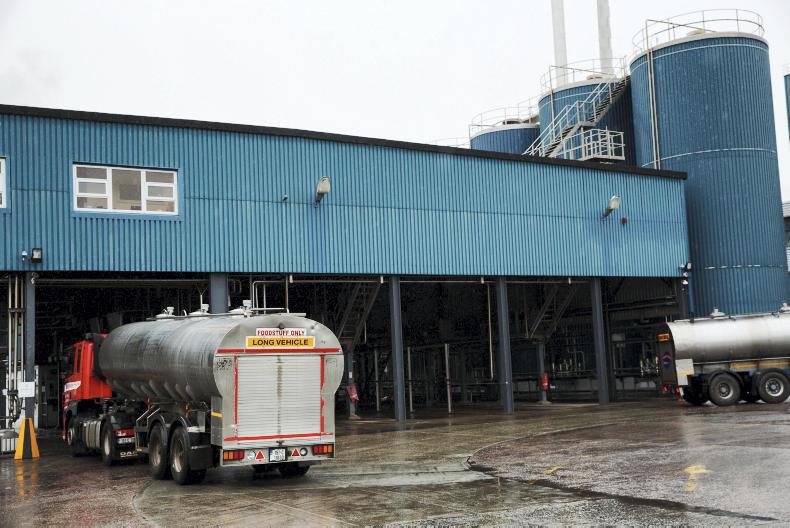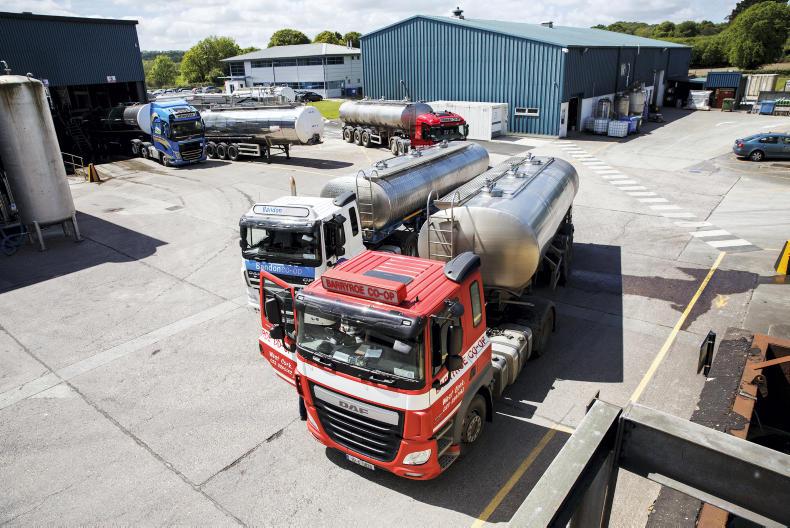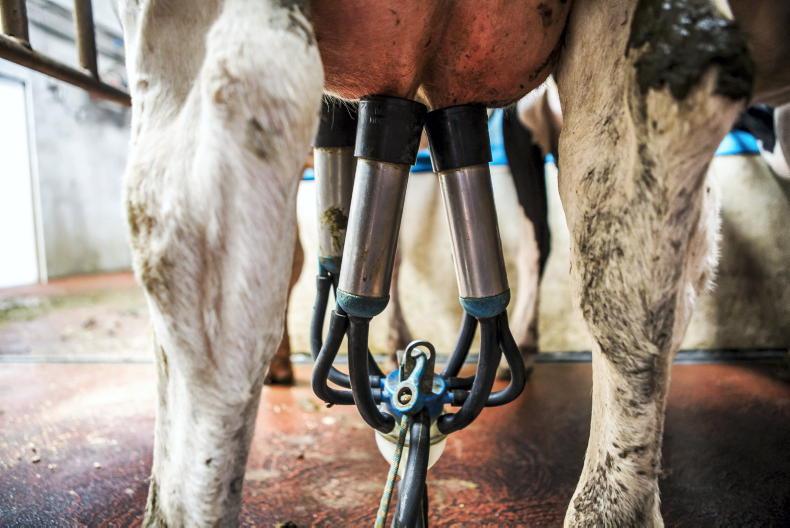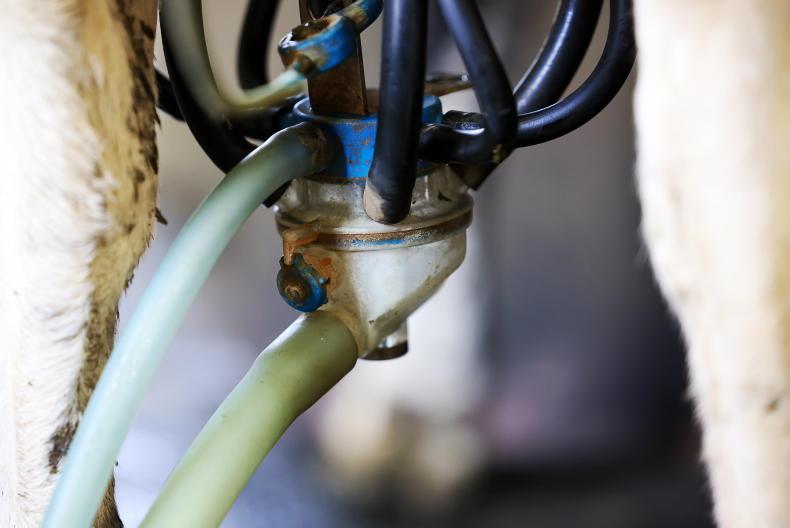The quantity and quality of milk testing among the large co-ops has moved on significantly over the past decade. To their credit, Glanbia, Carbery, Dairygold, Kerry, Arrabawn and Aurivo carry out a milk quality test on almost every tank of milk collected. These milk quality tests are used to calculate how much money the farmer gets paid for their milk.
However, many of the smaller co-ops, as well as the biggest processor on the island, Lakeland, are still in the slow lane when it comes to the regularity of milk testing. These co-ops process about 40% of the milk produced in Ireland, so are not insignificant players. In the Republic, the trend among these “second-tier testers” is to test for fat and protein a maximum of eight times per month even though there are usually 15 or 16 milk collections in the month. In Northern Ireland, the situation is worse, with some processors only testing three or four times per month.
This is a ridiculous scenario. Nearly all of the southern processors pay for milk on an A+B-C basis. This system places all the value on the fat and protein and puts a deduction on volume.
So, in effect, farmers supplying these processors with only minimal testing are being paid for their milk based on an average of 50% of the milk they supply. That’s like a tillage farmer weighing 50% of the loads that they deliver to the grain merchant and using those weights to get an average for the loads they didn’t weigh.#

Carbery tests every load of tank of milk collected from its farmer suppliers.
As we know, fat and protein levels can fluctuate from day to day depending on the quality of the grass and how well fed the cows are.
Farmers can be lucky and have their milk tested on the days that quality is high which would bring up their average.
Likewise, they could be unlucky and have their milk tested on the days that fat and protein are lower. This could coincide with issues outside of their control such as wet weather, etc.
Survey
Table 1 gives a breakdown of the different milk processors in Ireland and the regularity of their milk testing. All of the results are based on a survey of their farmer suppliers for April.
The gold standard is to test every tank of milk collected. This removes any ambiguity around fluctuations in milk quality and the timing of testing.
Overseas processors such as Fonterra in New Zealand, Friesland Campina in Holland, Arla in the UK and Dairy Farmers of America are included for comparison processors.
The only Irish processor that achieved this gold standard for the farmers surveyed was Carbery Group. As can be seen in the table, Kerry, Arrabawn, Glanbia and Aurivo were all pretty close to testing every collection.
Looking at the international co-ops, we see that Fonterra, Friesland Campina and Dairy Farmers of America achieve the gold standard. The data used for Fonterra was for October milk, which is more reflective of the peak supply curve as April is late lactation in New Zealand.
Extra cost
There is obviously extra cost to processors of more regular testing.
The top testing processors carry out twice as many tests per supplier as the rest.
There’s a capital cost in terms of getting the lab set up to handle large numbers of samples. There are also higher running costs, with more resources needed to handle more samples.
The top tier of processors have made the decision that this investment is in the best interests of their suppliers. The same cannot be said for the laggards. Options to centralise testing with independent laboratories exist rather than each co-op investing in extra equipment and higher testing standards. There are no excuses.
Accreditation and calibration of milk testing equipment is another subject. There are a number of companies that carry out tests on the milk testing equipment to check for accuracy. Teagasc Moorepark sends out what it calls milk standards to the various milk testing labs weekly. These are milk samples which have been tested in Moorepark and have a known fat and protein percentage.
The milk labs test these samples using their own instruments and the results should be the same.
A blind test is carried out once per month where the milk testing labs send a sample to Moorepark with fat and protein results. This sample is tested in Moorepark with a report drawn up detailing the accuracy of the initial test by the lab.
Other agencies can also be involved in the calibration and accreditation of the labs. For example, Camden, a UK-based company, carries out accreditation of the Glanbia milk testing lab in Dungarvan.
The Department of Agriculture has a relatively small part to play in accreditation of milk testing labs. Furthermore, participation in Moorepark testing or other accreditation and calibration services is more or less voluntary. Therefore, it is up to farmer representatives on co-op boards to ensure that the milk-testing labs in that co-op are up to the industry standard both in terms of the number of tests and the quality of the test results.
Lakeland Dairies is one of the only processors in the country to outsource its milk quality testing to Independent Milk Laboratories
Some co-ops, such as Centenary Thurles, have made significant investment, through member funds, in new milk testing facilities. But, as can be seen in Table 1, the co-op continues to lag behind the best in terms of frequency of milk testing. The Boherbue supplier was only tested for fat and protein three times in the month.
Lakeland Dairies is one of the only processors in the country to outsource its milk quality testing to Independent Milk Laboratories (IML). IML is a lab based in Cavan that carries out independent testing of milk along with disease screening. While independent milk testing is good, the frequency of the testing at Lakeland is poor, with only eight tests carried out in the month despite 21 collections.
While Lakeland can be classed as a poor performer in the south, it is one of the better performers in Northern Ireland with eight tests in the month.
Dale Farm tested its supplier only four times in the month while Glanbia Cheese, a subsidiary of the plc, only tested its supplier three times in April. The frequency of test results in Northern Ireland is exceptionally low, particularly when compared with Arla in the UK.
The quantity and quality of milk testing among the large co-ops has moved on significantly over the past decade. To their credit, Glanbia, Carbery, Dairygold, Kerry, Arrabawn and Aurivo carry out a milk quality test on almost every tank of milk collected. These milk quality tests are used to calculate how much money the farmer gets paid for their milk.
However, many of the smaller co-ops, as well as the biggest processor on the island, Lakeland, are still in the slow lane when it comes to the regularity of milk testing. These co-ops process about 40% of the milk produced in Ireland, so are not insignificant players. In the Republic, the trend among these “second-tier testers” is to test for fat and protein a maximum of eight times per month even though there are usually 15 or 16 milk collections in the month. In Northern Ireland, the situation is worse, with some processors only testing three or four times per month.
This is a ridiculous scenario. Nearly all of the southern processors pay for milk on an A+B-C basis. This system places all the value on the fat and protein and puts a deduction on volume.
So, in effect, farmers supplying these processors with only minimal testing are being paid for their milk based on an average of 50% of the milk they supply. That’s like a tillage farmer weighing 50% of the loads that they deliver to the grain merchant and using those weights to get an average for the loads they didn’t weigh.#

Carbery tests every load of tank of milk collected from its farmer suppliers.
As we know, fat and protein levels can fluctuate from day to day depending on the quality of the grass and how well fed the cows are.
Farmers can be lucky and have their milk tested on the days that quality is high which would bring up their average.
Likewise, they could be unlucky and have their milk tested on the days that fat and protein are lower. This could coincide with issues outside of their control such as wet weather, etc.
Survey
Table 1 gives a breakdown of the different milk processors in Ireland and the regularity of their milk testing. All of the results are based on a survey of their farmer suppliers for April.
The gold standard is to test every tank of milk collected. This removes any ambiguity around fluctuations in milk quality and the timing of testing.
Overseas processors such as Fonterra in New Zealand, Friesland Campina in Holland, Arla in the UK and Dairy Farmers of America are included for comparison processors.
The only Irish processor that achieved this gold standard for the farmers surveyed was Carbery Group. As can be seen in the table, Kerry, Arrabawn, Glanbia and Aurivo were all pretty close to testing every collection.
Looking at the international co-ops, we see that Fonterra, Friesland Campina and Dairy Farmers of America achieve the gold standard. The data used for Fonterra was for October milk, which is more reflective of the peak supply curve as April is late lactation in New Zealand.
Extra cost
There is obviously extra cost to processors of more regular testing.
The top testing processors carry out twice as many tests per supplier as the rest.
There’s a capital cost in terms of getting the lab set up to handle large numbers of samples. There are also higher running costs, with more resources needed to handle more samples.
The top tier of processors have made the decision that this investment is in the best interests of their suppliers. The same cannot be said for the laggards. Options to centralise testing with independent laboratories exist rather than each co-op investing in extra equipment and higher testing standards. There are no excuses.
Accreditation and calibration of milk testing equipment is another subject. There are a number of companies that carry out tests on the milk testing equipment to check for accuracy. Teagasc Moorepark sends out what it calls milk standards to the various milk testing labs weekly. These are milk samples which have been tested in Moorepark and have a known fat and protein percentage.
The milk labs test these samples using their own instruments and the results should be the same.
A blind test is carried out once per month where the milk testing labs send a sample to Moorepark with fat and protein results. This sample is tested in Moorepark with a report drawn up detailing the accuracy of the initial test by the lab.
Other agencies can also be involved in the calibration and accreditation of the labs. For example, Camden, a UK-based company, carries out accreditation of the Glanbia milk testing lab in Dungarvan.
The Department of Agriculture has a relatively small part to play in accreditation of milk testing labs. Furthermore, participation in Moorepark testing or other accreditation and calibration services is more or less voluntary. Therefore, it is up to farmer representatives on co-op boards to ensure that the milk-testing labs in that co-op are up to the industry standard both in terms of the number of tests and the quality of the test results.
Lakeland Dairies is one of the only processors in the country to outsource its milk quality testing to Independent Milk Laboratories
Some co-ops, such as Centenary Thurles, have made significant investment, through member funds, in new milk testing facilities. But, as can be seen in Table 1, the co-op continues to lag behind the best in terms of frequency of milk testing. The Boherbue supplier was only tested for fat and protein three times in the month.
Lakeland Dairies is one of the only processors in the country to outsource its milk quality testing to Independent Milk Laboratories (IML). IML is a lab based in Cavan that carries out independent testing of milk along with disease screening. While independent milk testing is good, the frequency of the testing at Lakeland is poor, with only eight tests carried out in the month despite 21 collections.
While Lakeland can be classed as a poor performer in the south, it is one of the better performers in Northern Ireland with eight tests in the month.
Dale Farm tested its supplier only four times in the month while Glanbia Cheese, a subsidiary of the plc, only tested its supplier three times in April. The frequency of test results in Northern Ireland is exceptionally low, particularly when compared with Arla in the UK.










SHARING OPTIONS